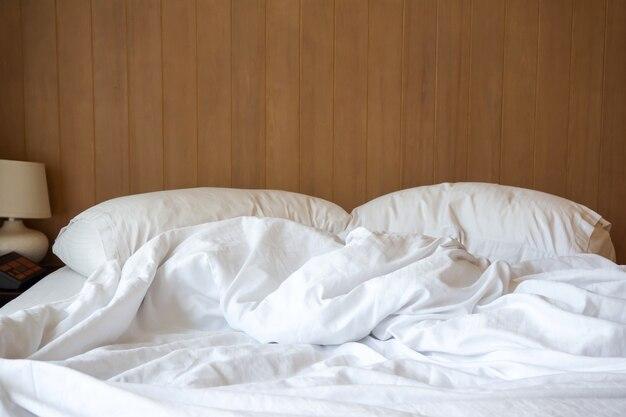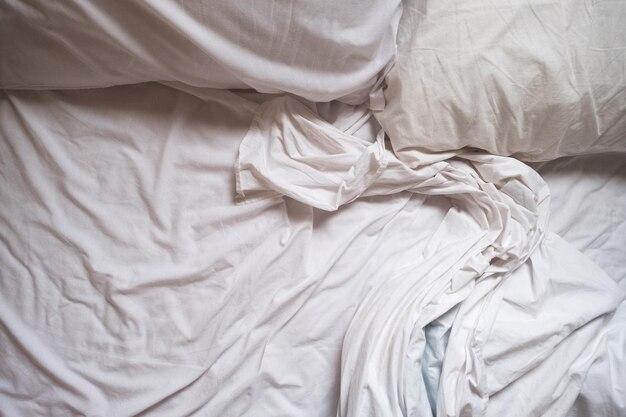Have you ever experienced the frustration of crawling into bed, only to find that your freshly washed sheets are making you itch? It’s a common problem that many people face, and it can be incredibly annoying. But don’t worry, you’re not alone. In this blog post, we’ll explore the reasons behind this itchiness and provide you with some helpful tips to prevent it from happening again.
We’ll discuss everything from the possibility of dust mites in your bed to the impact of laundry detergent on your skin. We’ll also address questions like how often you should change your bed sheets and whether fabric softener can make you itch. By the end of this blog post, you’ll have all the knowledge you need to banish that post-wash itchiness and enjoy a peaceful night’s sleep. So, let’s dive in and find out why your sheets are making you itch!

Why Do My Sheets Feel Scratchy After Washing?
Common Culprits of Itchy Sheets
If you’ve ever climbed into bed after a fresh wash only to be greeted by sheets that feel more like sandpaper, fear not! You’re not alone in this battle against the itch. There are a few common reasons why your sheets might feel scratchy after washing:
1. Fabric Softener Overdose
We all love the idea of soft, cozy sheets, but sometimes we unintentionally go overboard with the fabric softener. A little goes a long way, so if you’ve been pouring it in without measuring, your sheets might be paying the price.
2. Detergent Build-up
While detergent is necessary to get those linens clean, using too much of it can leave behind a residue that clings to the fibers of your sheets. Over time, this build-up can make your sheets feel rough and itchy.
3. Hard Water Woes
If you live in an area with hard water, it could be wreaking havoc on your sheets. Hard water contains mineral deposits that can make fabric feel stiff and abrasive. Luckily, there are ways to combat this issue.
How to Banish Scratchy Sheets for Good
Now that we’ve identified some possible causes, let’s dive into the solutions to save your sleep from itchiness:
1. Cut Back on the Fabric Softener
While fabric softener can give your sheets a pleasant smell and a touch of softness, too much of a good thing can turn against you. Start by using half the recommended amount of fabric softener, and work your way up if needed. Your sheets will thank you for it!
2. Rinse, Rinse, Rinse
To combat detergent build-up, make sure you’re giving your sheets a thorough rinse cycle. This will help remove any lingering residue and leave your sheets feeling fresher. Consider adding an extra rinse cycle to your washing routine for good measure.
3. Add a Vinegar Splash
For those battling hard water stains, adding a splash of white vinegar to your rinse cycle can work wonders. The acidity of the vinegar helps break down mineral deposits, leaving your sheets feeling soft and smooth.
Final Thoughts
Nobody wants to snuggle up in sheets that feel like they’ve been sprinkled with tiny thorns. By being mindful of your fabric softener usage, ensuring a thorough rinse, and giving hard water the vinegar treatment, you can bid farewell to the itch and embrace the cozy comfort of truly soft sheets. Sleep tight, and say goodbye to scratchiness!

FAQ: Why Are My Sheets Itchy After Washing?
[Witty and engaging introduction to the topic emphasizing the frustration of dealing with itchy bed sheets.]
How do I stop my bed sheets from itching
Ah, the relentless itchiness that disrupts the serenity of a peaceful slumber. Fear not, weary sleeper, for there are numerous ways to bid farewell to those pesky itches and reclaim your sweet dreams!
Opt for hypoallergenic bed sheets
The culprit behind your itch-fest might be an allergic reaction to the materials used in your bed sheets. Consider investing in hypoallergenic bed sheets made from gentle fabrics like bamboo or 100% cotton. These heavenly sheets are renowned for their ability to soothe even the crankiest of skin.
Wash your sheets with care
Your sheets go through quite the ordeal in the washing machine, and if not handled with love and tenderness, they might retaliate by becoming itchier than ever. Avoid harsh detergents and opt for fragrance-free, gentle ones to wash your sheets. And hey, don’t forget that extra rinse cycle!
Battle the dust mite army
Pesky dust mites, those microscopic troublemakers, can be the reason your sheets have transformed into itch central. Keep them at bay by regularly washing your sheets in hot water (at least 130°F or 54°C) to give those little rascals a fiery send-off.
How do I know if I have dust mites in my bed
Ah, the good ol’ dust mite detective work! While these critters can’t be seen with the naked eye, they certainly leave behind some telltale signs of their presence. Here’s how you can uncover their sneaky ways:
Sneezing, coughing, and wheezing
Do you find yourself resorting to an impromptu symphony of sneezes and coughs the moment you dive into your beloved sheets? Those pesky dust mites might be the culprits behind your sudden allergies. Time to don the detective hat!
Morning congestion and watery eyes
If you wake up feeling like you’re starring in a melodramatic soap opera with perpetually watery eyes and nasal congestion, it might be time to investigate those elusive dust mites lurking in your sheets. Who knew they could be such drama queens?
What are the signs of dust mites
Ah, those relentless dust mites are notorious for their secretive lifestyle. But fear not, observant sleeper, for there are signs that can reveal their presence:
Tiny red bite-like marks
If you wake up to find tiny, itchy, red bumps on your skin, it’s time to put on your detective hat and investigate the possibility of dust mites. They might be leaving you not-so-loving souvenirs for breakfast.
Visible fecal pellets
Yes, you read that right – dust mites have the audacity to leave their fecal matter behind, visible to the naked eye. If you spot tiny, dark specks on your sheets, it’s time to declare war on these impudent roommates.
Is it OK to change bed sheets once a month
Oh, dear reader, if only the answer were as simple as a resounding “yes” or “no.” The frequency of sheet changing is oft debated among sleep enthusiasts. However, here’s a general guideline to steer you in the right direction:
Every 1-2 weeks for optimal cleanliness
If you’re aiming for the pinnacle of cleanliness and a blissfully itch-free slumber, changing your sheets once every 1-2 weeks is a wise endeavor. Fresh sheets mean fewer dust mites, dirt, and buildup of the dreaded allergens. Oh, the joy of crisp, clean linens!
Monthly as a minimum requirement
If you’re more inclined to roll with a more relaxed approach to sheet changing, once a month is considered the minimum requirement. However, be prepared to face the consequences of possible itchiness and an increased dust mite population. Proceed with caution!
Why is my bed making me itchy
Ah, the mysterious case of the itchy bed! Don’t worry, dear reader, we shall unveil the secrets behind this insidious itchiness that plagues your sleeping hours.
Allergies, allergies everywhere!
Your bed might be a breeding ground for allergens that stir up a tumultuous dance with your immune system. Dust mites, pet dander, or even the infamous pollen can all contribute to your nightly itch-fest. Time to eliminate those bedroom allergen party crashers!
Synthetic fabrics with a rebellious streak
Those alluringly soft synthetic sheets might be the culprits behind your nightly scratching sessions. Their fibers can be rough on sensitive skin, leading to frustration and an unsightly clawed appearance. Opt for natural fabrics like cotton to tame the rebellious beast!
Why are my clothes scratchy after washing
Oh, the betrayal of scratchy clothes fresh out of the washing machine! Fear not, dear fashionista, for we shall expose the hidden reasons behind this wardrobe malfunction.
Hard water, the enemy of softness
Hard water, the arch-nemesis of soft clothes, can wreak havoc on your laundry game. Its excessive mineral content can leave behind a residue on your clothes, rendering them rough and scratchy. Show no mercy to hard water with the aid of water softeners or vinegar!
Overloading your washing machine
Ah, the tempting allure of shoving every piece of clothing you own into the washing machine. But beware! Overloading your machine prevents your clothes from receiving the gentle care they deserve, resulting in tangled fibers and an all-around scratchy situation. Give your clothes some breathing room, won’t you?
[Recap the main points discussed in the FAQ-style subsection and leave the reader with a sense of hope that they can bid farewell to their itchy sheet woes.]